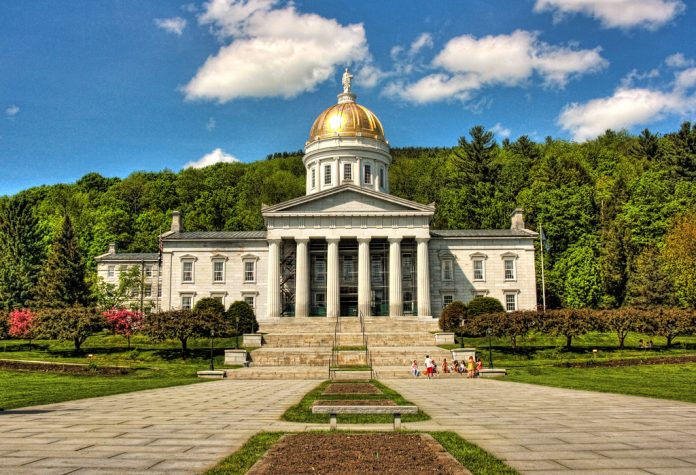Vermont lawmakers consider harmful taxes on the wealthy that would make the state less competitive. (Commentary)
By
Vermont lawmakers are considering the adoption of two new taxes on high earners, which proponents have branded “wealth taxes.” These proposals are not wealth taxes in the way that term has been traditionally understood (a tax on accumulated net worth). However, if enacted, they would make Vermont less attractive to the high earners who are responsible for a disproportionate share of the state’s existing tax revenue, less competitive regionally and nationally, and worse positioned for economic growth.
Through H.827, Vermonters with a net worth of $10 million or more would be taxed on unrealized capital gains. Specifically, the bill would apply individual income tax treatment to 50 percent of the unrealized gain or loss of a taxpayer’s assets. The tax would be capped at 10 percent of the worth of the taxpayer’s assets exceeding $10 million. Vermont would not seek to tax the same unrealized gains or losses twice; if an unrealized gain for a particular investment were taxed and then that gain was lost and regained, the restored return on investment would not be re-taxed.
The bill excludes certain classes of assets from the tax, including some retirement accounts (though Roth IRAs exceeding $1 million are subject to inclusion). The various exclusions reduce the gains counted toward the $10 million threshold and are also excluded from the amount to which the tax is applied.
Full-time Vermont residents would be subject to the tax as well as part-year and temporary residents with a substantial presence in the state. Whereas capital gains taxes are typically only paid in one’s domiciliary state, Vermont’s proposal would require certain nonresidents who spend a substantial amount of time in the state to remit taxes on a pro rata share of their unrealized gains as well, which raises constitutional questions.
Due to the specifics of the provision’s design—echoing, albeit somewhat incoherently, the federal government’s substantial presence test for resident aliens—it would mainly function as an exit tax. The tax would phase in over a four-year period for new residents, as they would receive a credit for gains that were accrued and taxed prior to obtaining Vermont residency. The gains would be apportioned based on years of residency.
Lawmakers are also considering levying a 3 percent income tax “surcharge” on Vermonters with federal adjusted gross income of $500,000 or more. The surcharge would be in addition to any other individual income tax owed. Per data presented to the legislature’s House Ways and Means Committee, in 2022, 3,560 tax returns reflecting federal adjusted gross incomes of $500,000 or more were filed in the state. These returns represented 1.1 percent of all Vermont tax returns, 16.7 percent of all Vermont adjusted gross income, and 30.4 percent of all net state individual income tax paid.
Vermont joins a growing number of states in either considering or enacting new or higher taxes on high earners and high-net-worth individuals. Massachusetts recently enacted a 4 percent surcharge on incomes above one million dollars. In contrast, Texas voters approved a constitutional measure that would forbid the legislature from ever enacting a wealth tax or a net worth tax.
Vermont currently employs a progressive individual income tax structure with four brackets and a top marginal rate of 8.75 percent, which is among the highest in the country. The state has also made efforts, and continues to consider others, to attract retired military members to the state by exempting a portion of military retirement pay. This is an attempt to bolster the state’s skilled workforce.
Why the state would take the opposite approach with high-net-worth individuals and high-income earners is perplexing, particularly as these individuals may very well provide the capital needed to support a larger and more skilled workforce. The tax policy that Vermont lawmakers are considering could create an even less friendly environment for investment and entrepreneurship, leaving the state worse off than it would have been by forgoing the revenue.
Proponents of such taxes argue that the wealthy do not migrate as they are relatively entrenched in their respective communities, allowing for greater taxation of these groups without the risk of losing population. However, there is evidence to the contrary, and even if high-net-worth residents are relatively immobile, when they do choose to relocate, taxation is a significant factor in their decision to seek residency elsewhere.
More concerning for Vermont, however, is not the outflow of a relatively small population, but the prospect of nonresident high-net-worth individuals opting against relocating to Vermont or investing in the local economy through second home purchases, of which Vermont (along with Maine) enjoys the highest nonresident homeownership.
Current part-year or temporary residents may seek to divest from Vermont assets entirely, leaving the state without an important segment of the property and sales tax bases. Once individuals opt to forgo second homes or capital investment in the state, the results are difficult to unwind and the detrimental outcomes could last for a very long time, leaving Vermont with significant challenges to growth and prosperity. These realities and concerns should be carefully thought through to ensure the trade-offs are well understood. Failing to do so could compound the problems these harmful taxes could bring to Vermont for decades to come.
Originally published by the Tax Foundation. Republished with permission.
For more great content from Budget & Tax News.











